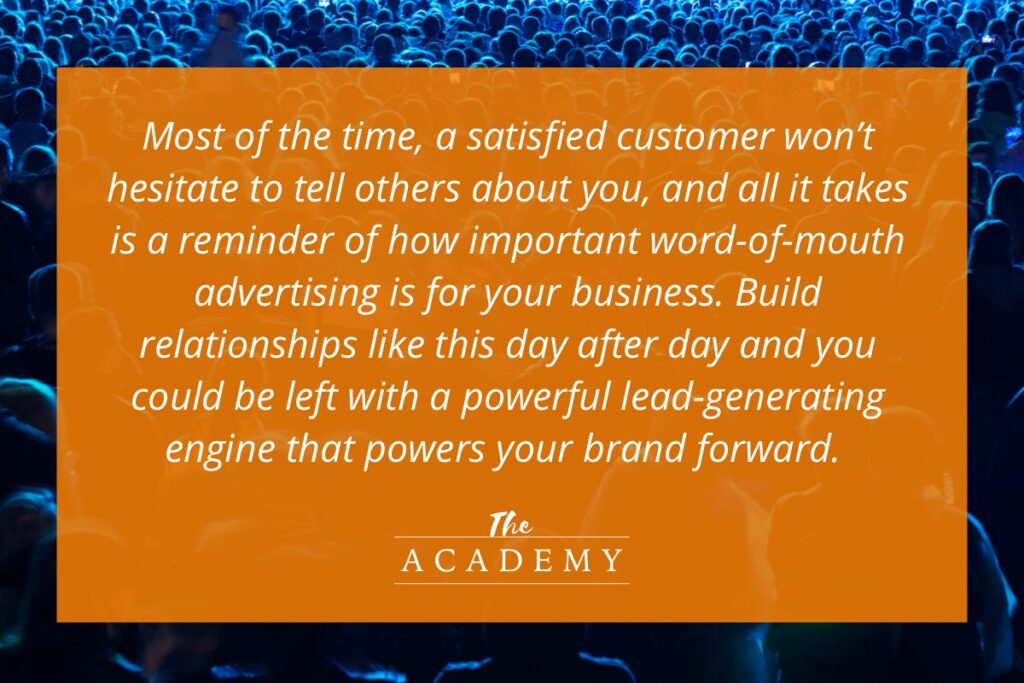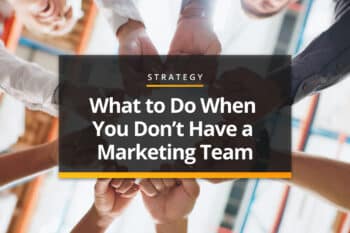
It’s hard work for any business to build an audience. In days gone by, building a following meant developing a group of people you could rely on to physically visit your store week after week and month after month. These people would not only spend money with you, but also would tell others that you were a business to be trusted.
Things look a little different today, but the idea hasn’t changed. Now when you are talking about your followers, you probably mean a digital audience that has decided to follow your brand on a social media platform. These kinds of followers are just as valuable, if not more so, than the audience you would have built a generation ago. There are many different ways to leverage this group of people to grow your business and boost the bottom line, and that’s the topic we will tackle below.
Why Word-of-Mouth Can’t Be Beat
Nothing you’ll ever create in your digital marketing department will hold a candle to a few candid words of endorsement for your business from one friend to another. That sentence might be a little disheartening. After all, you work hard on your marketing endeavors, but it’s a fact of life in business. And why will you never be able to match what one friend says to another? It comes down to a single word—trust.
Simply put, people want to be able to trust endorsements when they are being told that a business is worthy of their money. Of course you are going to say that customers should spend money with you—you want their money! Even if you are being as truthful as possible with your promotional efforts, there is always going to be at least a sliver of doubt in the minds of your potential customers about what you say. All customers have been lied to before by one company or another. Even the most ethical of companies is going to be viewed with some distrust due to the dishonesty of others. But that’s where your group of loyal and happy customers comes into play. They can be the voice that reassures potential customers that you are, in fact, telling the truth.

All this is not to say that you need to throw up your hands and give up entirely on marketing. Instead, you simply need to pivot your perspective slightly and think about how you can alter the way your message is delivered to potential customers. While you’ll still need to directly deliver your message in the form of various types of ads, you are also going to want to facilitate as much promotion on the part of your existing customers as possible. By enabling those who already trust your company to promote your products or services to others, you can essentially deploy an army of salespeople who aren’t viewed with skepticism because they don’t stand to gain financially from their support of your business.
As mentioned in the intro, the format of word-of-mouth advertising has changed with the advent of high-tech communications platforms, but the idea hasn’t changed for centuries, and is unlikely to change anytime soon. Growing your business successfully is always going to require a positive feedback loop where previously satisfied customers help spread the word to new buyers. That might sound like a passive form of marketing on your end, but there is actually a lot you can do to make sure this word-of-mouth promotion happens as often as possible. Let’s use the next section to dive into some ideas for how you can make it easy for followers to spread your message organically.
Don’t Leave Word-of-Mouth to Chance
What you don’t want to do is just assume that word-of-mouth promotion is going to happen naturally without you doing anything to help it along. Sure, there will still be the random referral that trickles in without any action on your end, but sitting back and waiting isn’t much of a strategy. Leaving things to chance rarely pays off in business and it’s unlikely to pay off here.
Instead, create a plan that is based on the specifics of your business to make it possible for those who have already done business with you to tell others they should do the same. The points below touch on some basic ideas:
- Every customer gets your best. The core of any word-of-mouth marketing strategy is to offer every single customer the absolute best service possible. On this point, it’s nothing but a numbers game. Let’s say, for example, that you serve 100 customers in a given month. If you are able to completely impress 90 of those customers, that’s 90 new people who will be happy to give you a positive recommendation when given the opportunity. On the other hand, if you only impress 70 of those customers, you’ve suddenly lost out on 20 potential promoters. In fact, the news is worse than that… Those 20 people not only won’t support your brand, but they may even actively speak against your business to family and friends. So, while it’s not realistic to think that every customer is going to come away happy, do everything within your power to provide them all with an excellent experience so you can turn the numbers in your favor.
- Make it easy. This is the point that moves to the forefront in the digital age. In years gone by, there wasn’t a lot you could do to help people spread the word about your business, other than maybe asking them at checkout to tell others about you. Now that so much commerce takes place online, you can easily help your customers promote your brand. For example, offer buttons they can use to post about their purchase to social channels like Facebook and Twitter. With just a click of a button, and without doing anything else, they can present your business to their entire list of followers. That way, your products don’t have to come up naturally in conversation. It will be a social share and others may feel like clicking on the post to learn more. These kinds of sharing options are extremely simple to set up and could pay off in at least a small way for years to come.
- Collect and share. You’ll also want to do what you can to take control of this process by gathering up the comments of past clients and customers that you can then use to promote your business in their own words. Shortly after a purchase is complete, follow up with the buyer and ask a couple of questions. First, ask them if they need anything in the aftermath of their purchase to increase their satisfaction. This is good customer service and will improve your standing in the industry. At the same time, ask if they would be willing to provide a testimonial that you can use to advertise on your site, in ads, etc. You should have a form in place, so you can simply provide a link to a page where the customer can quickly leave a testimonial and submit it to your system. As time passes, you’ll pick up more and more of these positive reviews, and you can leverage them in many ways to help potential customers to see what others have liked so much about your brand.
Don’t be bashful about asking happy customers to promote your business, whether it’s by sharing on social media, talking to friends and family or any other means of spreading the word. Most of the time, a satisfied customer won’t hesitate to tell others about you, and all it takes is a reminder of how important word-of-mouth advertising is for your business. Build relationships like this day after day and you could be left with a powerful lead-generating engine that powers your brand forward.

The Customer Journey Never Ends
In marketing, it’s common to talk about the “customer journey”. Typically, this journey focuses on the trip someone takes from the first time they encounter your brand until they make a purchase. That’s an important process, of course, but seeing this as a linear process is missing an important piece of the puzzle. What happens when the customer gets to the end of that line and spends money on one of your products or services? Is that the end? Hopefully not!
Instead of thinking of the customer journey as a line, it’s better to imagine it as a circle. Your customers can go through the same process as in a linear journey, with things like gathering information to look for alternatives as stops along the way. However, once they get to the point of making a purchase, that’s not the end of the line; the loop continues, and they come back around again. And, after the point where they make a purchase, they enter a phase of being a useful marketing asset that can tell others about what you offer.
While this difference might seem like semantics, it’s actually quite important to your approach to marketing. If you see this journey as a straight line, you are likely to forget about people once they buy from you. After all, the goal at the start was to get them to make a purchase, so once that goal is accomplished, isn’t it time to move on?
After the Purchase Comes the Review (Ideally)
Not even close. In fact, you could make the argument that someone who has recently made a purchase is now more valuable to your organization than ever before. Remember, the person who is most likely to buy from you is the person who has done so before. And, now that they have made a purchase, they are in a good position to promote your business to others. So, you’ve now got someone who might buy again and might tell others to do the same. That follower is extremely valuable and should be treated as such. Far from taking these people for granted or moving on to look for others, you should give them your utmost attention and make sure the relationship grows stronger rather than weaker moving forward.
A healthy marketing strategy is one that covers many different facets of promotion. Sure, you need to be producing quality ads, maybe doing some content marketing, and paying attention to the market around you to see what is working and what isn’t. At the same time, you need to be utilizing your most powerful asset—those who have already bought from your business—to ramp up growth and expand your footprint in the years to come. Good luck!
Most Popular Articles

Seeing Favicons in Your Google Search Results? Here’s Why…
Have you noticed anything different in your Google Search results lately? Google added tiny favicon icons to its organic search results in January. It was…

Business Growth and Digital Marketing News & Tips 11-17-24
Are you encouraging and rewarding innovation? Lee Cockerell is the former Executive Vice President of Operations at Walt Disney World. A lover of traditional red…

Business Growth and Digital Marketing News & Tips 11-27-24
A culture of gratitude "Feeling gratitude and not expressing it is like wrapping a present and not giving it." – William Arthur Ward Beyond being…








